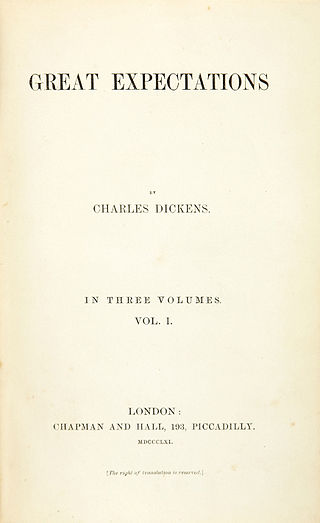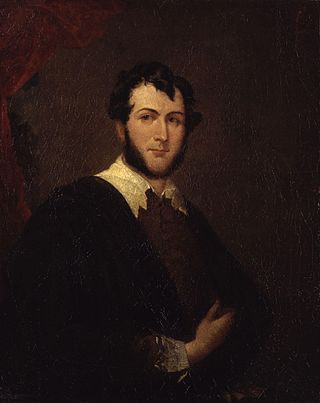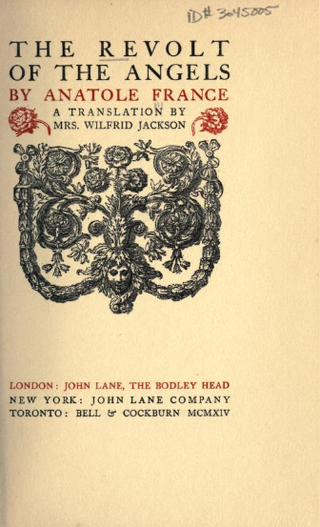The Booker Prize, formerly the Booker Prize for Fiction (1969–2001) and the Man Booker Prize (2002–2019), is a literary award conferred each year for the best novel written in the English language, which was published in the United Kingdom and Ireland. The winner of the Booker Prize receives international publicity that usually leads to a sales boost. When the prize was created, only novels written by Commonwealth, Irish, and South African citizens were eligible to receive the prize; in 2014, eligibility was widened to any English-language novel—a change that proved controversial.

Charles John Huffam Dickens was an English novelist and social critic who created some of the world's best-known fictional characters, and is regarded by many as the greatest novelist of the Victorian era. His works enjoyed unprecedented popularity during his lifetime and, by the 20th century, critics and scholars had recognised him as a literary genius. His novels and short stories are widely read today.
Political fiction employs narrative to comment on political events, systems and theories. Works of political fiction, such as political novels, often "directly criticize an existing society or present an alternative, even fantastic, reality". The political novel overlaps with the social novel, proletarian novel, and social science fiction.

Great Expectations is the thirteenth novel by Charles Dickens and his penultimate completed novel. It depicts the education of an orphan nicknamed Pip. It is Dickens' second novel, after David Copperfield, to be fully narrated in the first person. The novel was first published as a serial in Dickens's weekly periodical All the Year Round, from 1 December 1860 to August 1861. In October 1861, Chapman & Hall published the novel in three volumes.

Zadie Smith FRSL is an English novelist, essayist, and short-story writer. Her debut novel, White Teeth (2000), immediately became a best-seller and won a number of awards. She became a tenured professor in the Creative Writing faculty of New York University in September 2010.

George Cruikshank or Cruickshank was a British caricaturist and book illustrator, praised as the "modern Hogarth" during his life. His book illustrations for his friend Charles Dickens, and many other authors, reached an international audience.
White guilt is a belief that white people bear a collective responsibility for the harm which has resulted from historical or current racist treatment of people belonging to other racial groups, as for example in the context of the Atlantic slave trade, European colonialism, and the genocide of indigenous peoples.
Whiteness studies is the study of the structures that produce white privilege, the examination of what whiteness is when analyzed as a race, a culture, and a source of systemic racism, and the exploration of other social phenomena generated by the societal compositions, perceptions and group behaviors of white people. It is an interdisciplinary arena of inquiry that has developed beginning in the United States from white trash studies and critical race studies, particularly since the late 20th century. It is focused on what proponents describe as the cultural, historical and sociological aspects of people identified as white, and the social construction of "whiteness" as an ideology tied to social status.
White privilege, or white skin privilege, is the societal privilege that benefits white people over non-white people in some societies, particularly if they are otherwise under the same social, political, or economic circumstances. With roots in European colonialism and imperialism, and the Atlantic slave trade, white privilege has developed in circumstances that have broadly sought to protect white racial privileges, various national citizenships, and other rights or special benefits.

Paul Beatty is an American author and an associate professor of writing at Columbia University. In 2016, he won the National Book Critics Circle Award and the Booker Prize for his novel The Sellout. It was the first time a writer from the United States was honored with the Man Booker.
Racial passing occurs when a person who is classified as a member of a racial group is accepted or perceived ("passes") as a member of another racial group.
The social novel, also known as the social problemnovel, is a "work of fiction in which a prevailing social problem, such as gender, race, or class prejudice, is dramatized through its effect on the characters of a novel". More specific examples of social problems that are addressed in such works include poverty, conditions in factories and mines, the plight of child labor, violence against women, rising criminality, and epidemics because of over-crowding and poor sanitation in cities.
Joy Williams is an American novelist, short-story writer, and essayist. Her notable works of fiction include State of Grace, The Changeling, and Harrow. Williams has received a Guggenheim Fellowship for Creative Arts, a Rea Award for the Short Story, a Kirkus Award for Fiction, and a Library of Congress Prize for American Fiction.
The Bollinger Everyman Wodehouse Prize is the United Kingdom's first literary award for comic literature. Established in 2000 and named in honour of P. G. Wodehouse, past winners include Paul Torday in 2007 with Salmon Fishing in the Yemen and Marina Lewycka with A Short History of Tractors in Ukrainian 2005 and Jasper Fforde for The Well of Lost Plots in 2004. Gary Shteyngart was the first American winner in 2011.
Oneworld Publications is a British independent publishing firm founded in 1986 by Novin Doostdar and Juliet Mabey originally to publish accessible non-fiction by experts and academics for the general market. Based in London, it later added a literary fiction list and both a children's list and an upmarket crime list, and now publishes across a wide range of subjects, including history, politics, current affairs, popular science, religion, philosophy, and psychology, as well as literary fiction, crime fiction and suspense, and children's titles.
The St. Francis College Literary Prize is a biennial literary award inaugurated in 2009. The prize of US$50,000 is presented to a mid-career author in honor of a third to fifth book of fiction. The winner is selected by a jury and invited to St. Francis College in Brooklyn, New York, for a speech. The SFC Literary Prize is meant to offer encouragement and significant financial support to a mid-career writer. The winner of the prize is announced from a whittled down shortlist during the Brooklyn Book Festival every other year in September.

The Revolt of the Angels is a 1914 novel by Anatole France.
This article contains information about the literary events and publications of 2016.

The 2016 Booker Prize for Fiction was awarded at a ceremony on 25 October 2016. The Man Booker dozen of 13 books was announced on 27 July, narrowed down to a shortlist of six titles on 13 September. Paul Beatty was awarded the 2016 Booker Prize for his novel The Sellout, receiving 50,000 pounds ($61,000), and becoming the first American author to be awarded the prize.

Interior Chinatown is a 2020 novel by Charles Yu. It is his second novel and was published by Pantheon Books on January 28, 2020. It won the 2020 National Book Award for Fiction. The novel was also longlisted for the 2021 Andrew Carnegie Medal for Excellence in Fiction and was shortlisted for the Prix Médicis étranger.









